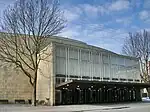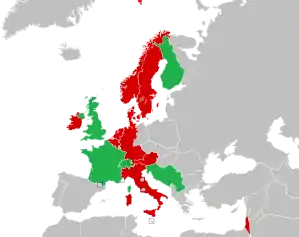| Eurovision Young Musicians 1986 | |
|---|---|
| Dates | |
| Semi-final 1 | 22 May 1986 |
| Semi-final 2 | 23 May 1986 |
| Final | 27 May 1986 |
| Host | |
| Venue | Koncerthuset, Copenhagen, Denmark |
| Presenter(s) | Anette Faaborg |
| Musical director | Hans Graf |
| Directed by | Marianne Montell |
| Executive supervisor | Frank Naef |
| Executive producer | Niels Karl Nielsen |
| Host broadcaster | Danmarks Radio (DR) |
| Participants | |
| Number of entries | 15 (5 qualified) |
| Debuting countries | |
| Returning countries | |
| Non-returning countries | None |
Participation map
| |
| Vote | |
| Voting system | Jury chose their top 3 favourites by vote. |
| Winning musician |
|
The Eurovision Young Musicians 1986 was the third edition of the Eurovision Young Musicians, held at the Koncerthuset, in Copenhagen, Denmark on 27 May 1986.[1] Organised by the European Broadcasting Union (EBU) and host broadcaster Danmarks Radio (DR), musicians from five countries participated in the televised final. Despite the contest being held in Copenhagen, host country Denmark failed to qualify for the final alongside Germany, Austria, Israel, Belgium, Norway, Ireland, Sweden, Netherlands and Italy. The participant artists could not be older than 19 by the time of the contest. The finalists were all accompanied by the Danish Radio Symphony Orchestra under the leadership of Hans Graf.[1]
France's Sandrine Lazarides won the contest, with Switzerland and Finland placing second and third respectively.[2]
Location

The Koncerthuset at Radiohuset in Copenhagen, Denmark, was the host venue for the 1986 edition of the Eurovision Young Musicians.[1]
Radiohuset (literally "Radio House") is the former headquarters of national Danish broadcaster DR, located on Rosenørns Allé in Frederiksberg, Copenhagen. The building complex was inaugurated in 1945 to a Functionalist design by Vilhelm Lauritzen and later expanded in 1958 and 1972. Vacated by DR when DR Byen was inaugurated in 2006, the buildings now house the Royal Danish Academy of Music as well as the Museum of Music. The complex also contains a 1,200-seat concert hall, Koncerthuset.
Format
Anette Faaborg was the host of the 1986 contest.[1] Each participating country were able to send male or female artists who were no older than 19 years of age, to represent them by playing a classical piece of their choice, accompanied by the Danish Radio Symphony Orchestra under the leadership of Hans Graf. The winner and runner-up of the previous edition, Isabelle van Keulen and Olli Mustonen respectively, performed "Suite Italienne" during the interval.[1]
Results
Preliminary round
A total of fifteen countries took part in the preliminary round of the 1986 contest, of which five qualified to the televised grand final. The following countries failed to qualify.[1]
Final
Awards were given to the top three countries. The table below highlights these using gold, silver, and bronze. The placing results of the remaining participants is unknown and never made public by the European Broadcasting Union.[2]
| Draw | Country | Performer | Instrument | Piece | Result |
|---|---|---|---|---|---|
| 01 | Sandrine Lazarides | Piano | Piano Concerto E flat by Franz Liszt | 1 | |
| 02 | Alan Brind | Violin | Concerto for violin and orchestra D minor, op.47, 1st movement by Jean Sibelius | – | |
| 03 | Aleksandar Madžar | Piano | Piano Concerto no.4 G major, op.58, 2nd and 3rd movements by Ludwig van Beethoven | – | |
| 04 | Jan-Erik Gustafsson | Cello | Variations on a Rococo Theme for Violoncello and Orchestra, op.33 by Pyotr Tchaikovsky | 3 | |
| 05 | Marian Rosenfeld | Piano | Piano Concerto no.1 E minor, op.11, 2nd and 3rd movements by Frédéric Chopin | 2 | |
Jury members
The jury members consisted of the following:[3][1]
Preliminary round
 Austria – Franz Wagner
Austria – Franz Wagner.svg.png.webp) Belgium – Fud Leclerc
Belgium – Fud Leclerc Denmark – Mogens Andersen
Denmark – Mogens Andersen Finland – Anna-Karina Bentley
Finland – Anna-Karina Bentley France – Serge Kaufmann
France – Serge Kaufmann Germany – Richard Jakoby
Germany – Richard Jakoby Ireland – Jane Carty
Ireland – Jane Carty Israel – Ávi Hannáni
Israel – Ávi Hannáni Italy – Ilio Catani
Italy – Ilio Catani Netherlands – Ton Hartsuiker
Netherlands – Ton Hartsuiker Netherlands – Robbert Jan de Neeve
Netherlands – Robbert Jan de Neeve Norway – Jan Eriksen
Norway – Jan Eriksen.svg.png.webp) Switzerland – Michel Dami
Switzerland – Michel Dami Sweden – Sten Andersson
Sweden – Sten Andersson United Kingdom – John Manduall
United Kingdom – John Manduall.svg.png.webp) Yugoslavia – Seadeta Midžić
Yugoslavia – Seadeta Midžić
Final
 Austria/
Austria/ United States – Carole Dawn Reinhart
United States – Carole Dawn Reinhart.svg.png.webp) Belgium – Georges Dumortier
Belgium – Georges Dumortier Denmark – Poul Birkelund
Denmark – Poul Birkelund Finland – Hannu-Ilari Lampila
Finland – Hannu-Ilari Lampila France – Teresa Llacuna
France – Teresa Llacuna Germany – Siegfried Palm
Germany – Siegfried Palm Italy – Claudio Scimone (head juror)
Italy – Claudio Scimone (head juror) Netherlands – Ton Hartsuiker
Netherlands – Ton Hartsuiker Sweden – Björn Liljequist
Sweden – Björn Liljequist United Kingdom – Sir David Willcocks
United Kingdom – Sir David Willcocks.svg.png.webp) Yugoslavia – Jasna Nemec Novak
Yugoslavia – Jasna Nemec Novak
Broadcasting
EBU members from the following countries broadcast the final round. Portugal broadcast the contest in addition to the competing countries.[3]
| Country | Broadcaster(s) |
|---|---|
| ORF | |
| RTBF | |
| DR | |
| Yle | |
| France 3 | |
| ZDF | |
| RTÉ | |
| IBA | |
| Rai 3 | |
| NOS | |
| NRK | |
| SVT | |
| SSR | |
| BBC | |
| JRT | |
| Country | Broadcaster |
|---|---|
| RTP | |
Other countries
See also
References
- 1 2 3 4 5 6 7 "Eurovision Young Musicians 1986: About the show". European Broadcasting Union. Archived from the original on 20 September 2015. Retrieved 5 October 2014.
- 1 2 "Eurovision Young Musicians 1986: Participants". youngmusicians.tv. European Broadcasting Union. Archived from the original on 20 September 2015. Retrieved 5 October 2014.
- 1 2 3 "Eurovision Young Musicians 1986". Issuu. Retrieved 18 August 2018.
